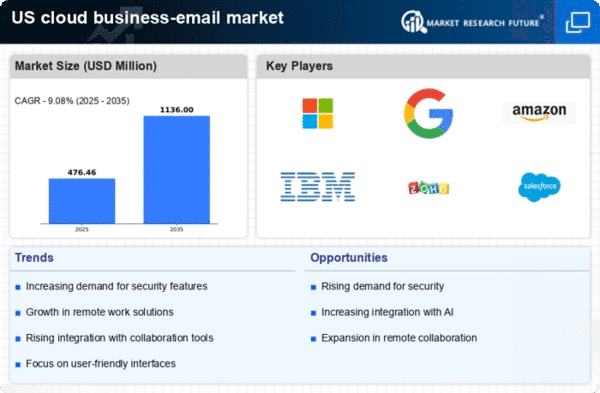Expansion of Mobile Email Access
The expansion of mobile email access significantly impacts the cloud business-email market. With the proliferation of smartphones and tablets, employees increasingly rely on mobile devices for email communication. In 2025, it is projected that over 75% of US professionals access their email via mobile platforms. This trend underscores the necessity for cloud-based email services to offer seamless mobile compatibility and user-friendly interfaces. As businesses adapt to this shift in communication preferences, the cloud business-email market is poised for growth, as providers enhance their offerings to meet the demands of a mobile workforce.
Integration of Artificial Intelligence
The integration of artificial intelligence (AI) into email services is transforming the cloud business-email market. AI technologies enhance email management through features such as smart sorting, automated responses, and predictive analytics. In 2025, around 40% of US businesses are expected to adopt AI-driven email solutions to improve efficiency and user experience. This trend suggests that companies are increasingly recognizing the value of AI in optimizing communication workflows. Consequently, the cloud business-email market is likely to expand as providers innovate and offer AI-enhanced features that cater to the evolving needs of businesses.
Rising Demand for Remote Work Solutions
The cloud business-email market experiences a notable surge in demand for remote work solutions. As organizations increasingly adopt flexible work arrangements, the need for reliable and accessible email services becomes paramount. In 2025, approximately 70% of US companies report utilizing cloud-based email systems to facilitate communication among remote teams. This trend indicates a shift towards digital collaboration tools, which are essential for maintaining productivity in a dispersed workforce. The cloud business-email market is thus positioned to benefit from this growing reliance on remote work technologies, as businesses seek to enhance their operational efficiency and streamline communication processes.
Advancements in Email Security Technologies
The cloud business-email market is witnessing significant advancements in email security technologies. With the rise of cyber threats, organizations prioritize secure email solutions to protect sensitive information. In 2025, it is estimated that 60% of US businesses invest in advanced security features such as encryption and multi-factor authentication. These enhancements not only safeguard against data breaches but also build trust with clients and partners. As a result, the demand for secure cloud-based email services is likely to increase, driving growth in the cloud business-email market as companies seek to mitigate risks associated with email communication.
Growing Importance of Compliance and Regulations
The cloud business-email market faces increasing scrutiny regarding compliance with data protection regulations. As laws such as the California Consumer Privacy Act (CCPA) gain traction, businesses must ensure their email services adhere to stringent compliance standards. In 2025, approximately 55% of US companies report prioritizing compliance when selecting cloud-based email providers. This focus on regulatory adherence drives demand for email solutions that offer robust compliance features, thereby influencing purchasing decisions. As organizations navigate the complexities of data privacy, the cloud business-email market is likely to see growth in services that emphasize compliance and security.
















